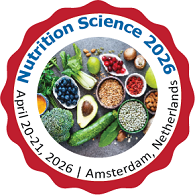Call for Abstract
Scientific Program
30th World Congress on Nutrition and Food Sciences, will be organized around the theme “Redefining Global Nutrition: Emerging Trends in Food Science and Health Research”
Nutrition Science 2026 is comprised of keynote and speakers sessions on latest cutting edge research designed to offer comprehensive global discussions that address current issues in Nutrition Science 2026
Submit your abstract to any of the mentioned tracks.
Register now for the conference by choosing an appropriate package suitable to you.

